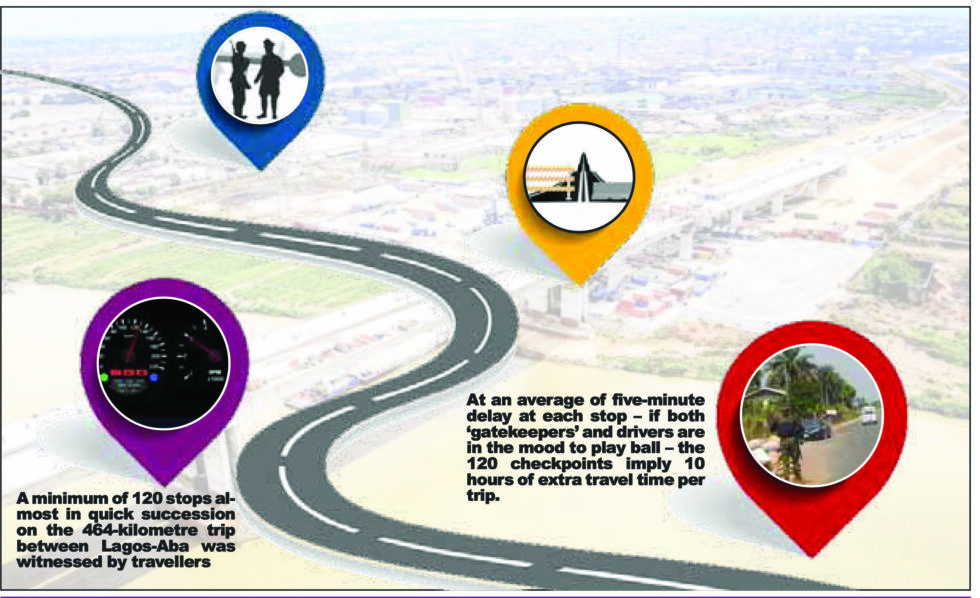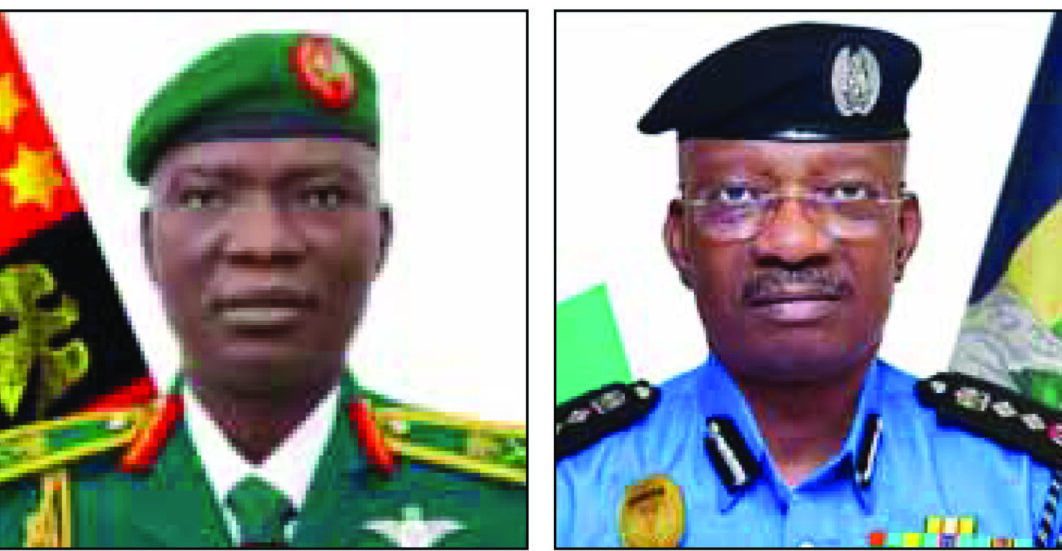
Road travel in the South has rarely been an epic joyride, but it just got worse. Multiple checkpoints by various security agencies and touts alike – sometimes at 500-metre intervals – suggest a no-thoroughfare to the Eastern part of the country. While the need for security presence is understood by all, most harrowing is the attendant bedlam that serves more extortion and harassment purposes than the protection of lives and property, Bertram Nwannekanma (Lagos), Lawrence Njoku (Enugu), Charles Ogugbuaja and Collins Osuji (Owerri) report.
The distance from Lagos to Aba, in Abia State, is 464 kilometres, and normally completed in six to eight hours. While the road infrastructure has improved, to anticipate a better sail for motorists, the traffic has become more chaotic – with a new travel time of 12 to 16 hours!
The Southern corridors are not new to security checkpoints, but t hey have more than doubled lately. A recent count by The Guardian at the last festive season showed over 120 stops almost in quick succession on the 464-kilometre trip.
Between Lagos and Ore are about 40 checkpoints demarcated with wooden flatbeds, logs, sandbags, and fire cans. Ore to Benin has 46 of them. Benin to Onitsha, 25. Travellers inbound from Owerri, Enugu, Abakaliki, Asaba, and Rivers have scores of checkpoints to add to the list.
At an average of five-minute delay at each stop – if both ‘gatekeepers’ and driver are in the mood to play ball – the 120 checkpoints imply 10 hours of extra travel time per trip.
At intervals are unpleasant experiences for both the drivers, who had to part with ‘toll fares’, and commuters, who had to endure the agony of the transaction.
‘Military’ zone, keep off!
Although the unpleasant experiences start from the Sagamu-Ore-Benin expressway to Southeastern states, it is, however, more traumatic within the East. More harrowing is Enugu to Port Harcourt; Enugu to Onitsha in Anambra State, Owerri in Imo State and Abakaliki in Ebonyi State.
On January 1, 2024, Chiamaka, who was travelling to her village for the yuletide, had an unusual experience. The mother of one boarded a bus from Owerri-Akwakuma to Nwaorieubi in Mbaitoli Local Council of Imo State. Just 15 minutes into the journey, they came face to face with security men at a checkpoint. The officers halted their movement temporarily until their driver parted with N100 to resume the journey.
A few minutes later, they ran into traffic. Wondering whether there was an accident ahead, they continued slowly until they discovered another checkpoint where security officers, who had barricaded both sides of the road, left about six feet of space for a long line of vehicles to meander after the drivers must have parted with some Naira notes.

They met five security checkpoints of the Army, police, and other security outfits during the journey of about two kilometres. She noted that the driver was forced to part with N100 or more at every checkpoint.
Chiamaka lamented that her experience at the Army checkpoint in Ama-well, before Nwaorieubi police station, was traumatic.
“When we got to the army checkpoint, we were asked to alight from the bus. We did and they ordered us to trek a reasonable distance until we left the army checkpoint. The weather was inclement as we walked in the scorching sun.
“Ahead were a lot of buses in the queue, waiting for their passengers to board for the continuation of their journey. It took us a few minutes to locate our bus and we moved on.
“It was demeaning. I thought by now, all these things would have stopped in the Southeast, where commuters are forced to alight from their vehicles and cross the checkpoint on legs with hands raised, but here we are again. This is sad. Why do passengers have to come down and trek to be profiled? Are we all criminals?” she queried.
Chiamaka’s experience represents what many travellers pass through at the numerous checkpoints that dot the Southeast roads cordoned by battle-ready security officials – with one hand on the trigger and the other held out to receive money from hapless motorists.
Some popular checkpoints are also seen along Owerri-Aba expressway, Onitsha-Owerri expressway, and Aba-Enugu expressway as well as MDS, Amaraku/Anara/Okigwe Road in Imo State.
They abound at entrances of the new Kenyatta market; the old toll gate; the University of Nigeria Teachings Hospital (UNTH) in Ituku; Isuawa; Amolli junction; Nenwe; Mgboho, Awgu junction; Enugu-Abia boundary; Isiagu; Ihube; Lokpanta; Okigwe junction; Mkpa; and Ohia.
Others are Eke Obinagu junction, Owo, Nkalagu, Enugu-Ebonyi border, Onueke, Ugwu Onyeama, Ninth Mile, Ezeagu, Oji River junction, Ugwuoba, Enugu-Awka boundary, Awkuzu, Oyi junction, Onuimo, among numerous others.
 At some of these checkpoints, there are neither hurries nor urgency. You are told to either turn off the engine or keep it running. Either way, you obey without complaint. If the officers see your face puckered or you grumble, you will be subjected to abuse, harassment, intimidation and/or longer delays.
At some of these checkpoints, there are neither hurries nor urgency. You are told to either turn off the engine or keep it running. Either way, you obey without complaint. If the officers see your face puckered or you grumble, you will be subjected to abuse, harassment, intimidation and/or longer delays.
A commuter, Ogechi, said: “We are not happy with soldiers’ manner of checking passengers here at Aba Road/Sam Mbakwe International Cargo Airport, Owerri. Why should a traveller be made to come down from his or her vehicle and be made to walk from one point of a checkpoint to the other point and re-enter the vehicle? This is inhuman! Let the military authorities stop this.
“I am also not happy that security operatives constantly ask commercial drivers to pay as much as N200 at checkpoints. There are several checkpoints on Aba Road operating openly. Can’t the authorities stop this mess? Our reputation is ruined by these unending acts.”
Another resident, Jonah Obi, said he was embittered by the directive by the soldiers to commuters to alight from vehicles and walk to another point of a checkpoint.
He said: “Not everybody is a criminal. Security operatives manning these checkpoints should be monitored and disciplined. This (excess) is too much.”
Old habits die hard
The proliferation of checkpoints in the East is not new but has increased due to the rise in violent crimes such as kidnapping and armed robberies on the highways. Although stakeholders have continued to call for caution and the dismantling of the countless roadblocks, the calls have fallen on deaf ears.
For instance, the then President General of Ohanaeze Ndigbo, Chief Nnia Nwodo, had in 2019 queried the development.
He said: “Evidence available to us indicates an unusual number of military, paramilitary and police checkpoints in all routes leading into and within Igbo land. To be precise, our report presents the following gory picture: there are 60 checkpoints between Lagos and Onitsha (a major route for Igbo traders) thus: Lagos to Ore 24 checkpoints, Ore to Benin 23 checkpoints, Benin to Onitsha 13 checkpoints. Just in Enugu State alone, the checkpoints are uncountable.
“The interpretation is that these checkpoints, which are mainly interested in extorting money from numerous Igbos passing through them, are mere toll gates. The nonchalant attitude of the Federal Government and heads of security agencies gives the impression that the erection of these “toll gates” is deliberate, extortionist and intended to subdue the will of the people.
“In some instances, these security agents attend these ‘toll gates’ with POS (Point of Sale) machines, which they use to force travellers who have no cash but possess debit cards to forcibly transfer cash to their private accounts.”
A lot has since changed but for the worse. An Igbo leader, Chief Ralph Obioha told The Guardian that no fewer than 300 security checkpoints mounted by soldiers and police now exist in the Southeast region, stressing that the delay it is creating in the movement of goods and services is unimaginable.

A printer, Clinton Ugwu, who travelled from Enugu to Abiriba in Abia State during the Yuletide season, told The Guardian that he counted no fewer than eight security checkpoints from Umuahia to Abiriba.
He, however, said throughout the journey, they were never asked to alight from their vehicle, and “this is the only thing that has changed within the period.”
“I want to believe that it was so because of the volume of traffic on the road, otherwise before now, you must alight and walk past every security checkpoint.”
Ugwu stated that it was baffling how their driver parted with N100 at each security checkpoint, adding that, “in some cases, they will even return a ‘change’ of N100 in case you gave them N200.”
Travelling from his hometown in Mbaise, Imo State, to Enugu after the Christmas celebrations and experiencing the frustrations on the highway, John Igwe said: “The GOC 82 Division, Nigerian Army should do something this 2024 over the open extortion of motorists plying Southeast roads by soldiers at various army checkpoints, especially Enugu-Onitsha and Enugu-Port Harcourt roads.
“This is becoming a huge embarrassment and shameful to the country and Army. They now give ‘change’ to commercial drivers like the police. The GOC and Garrison Commanders should do something please.”
For the love of country, safety of all
Militarisation of Southeast roads began with an increase in insecurity created by the activities of agitators, banditry, kidnapping, farmer-herder clashes, cultism, and armed robbery, among others. In 2016, the Federal Government launched military operations to check the rising insecurity in the Southeast region.
It started with Operation Python Dance in Onitsha, Anambra State as the operational base. The exercise saw several military personnel mounted at strategic places regarded as dark spots in Anambra State.
A year later in 2017, Operation Python Dance 11, which had its base in Umuahia, Abia State was launched and went full swing in other states in the region. Since then, this has been the deployment of more military personnel during the yuletide into the Southeast region in what the army described as a ‘special exercise’ to flush out crimes and criminality from the region.
When he flagged off the “Exercise Operation Golden Dawn 111”, in Owerri, Imo State, late last year, the General Officer Commanding 82 Division, Nigerian Army, Enugu, Major Gen. Hassan Dada said it was to compliment efforts of other security agencies to wipe out crimes in the region and ensure hitch-free yuletide season.
Before, only suspected vehicles were asked to pull over by security operatives with their passengers thoroughly frisked, even as the soldiers were alert as the vehicles moved. However, that is no longer the case as all travellers are now suspects.
Worried by the harsh reality, the head of the Igbo socio–cultural organisation, Ohanaeze Ndigbo, Nwodo, at a recent security summit held in Enugu, complained that the Southeast alone harboured over half of all checkpoints in the country. Arguing that the logic is flawed, he called for the dislodging of the roadblocks.
Apparently, in agreement, the President of the Coalition of Southeast Youth Leaders (COSEYL), Goodluck Ibem, said the military checkpoints had been “turned to places where innocent Nigerians are subjected to different degrees of inhuman treatments, for failing to pay bribes or murmuring when a motorist pays a bribe.”
Ibem said: “Trucks are forced to pay as high as N2,000 to N3,000 per truck. Buses pay N500 to N1000, and cars pay N200 to N500 depending on the soldiers’ mood.
“We demand the immediate dismantling of all military checkpoints and roadblocks in Southeast roads because they have outlived their purpose. We demand the immediate arrest and prosecution of those soldiers involved in the collection of bribes on our roads, which have helped to destroy the security of the zone.”

Security agencies can do better
Social Affairs Commentator, Justus Nwoha, however, disagreed that the checkpoint phenomenon had lost its essence.
Nwoha noted that the stopgap measure, though inconvenient, has helped the security forces to recover open spaces created by the activities of unknown gunmen.
He stated that the improved presence of security operatives, especially during ember months drastically reduces crimes, adding that, “if you look back, you will agree that we did not record many incidents of kidnapping and other violent crimes. That is because these men of the underworld knew that there was a superior power and the best thing for them was to lie low.
“We are gradually recovering from what used to be a bad situation to the era where you could say you can confidently move around. I understand the negative attitude of those officials who have turned the assignment into a money-making venture, but that was not why they were sent to those roads. Anyhow, let us not throw away the gains because of certain bad elements in the system,” he appealed.
On his part, the national coordinator of the Human Rights Writers Association of Nigeria (HURIWA), Emmanuel Onwubiko, said the militarisation of Southeast Nigeria is a big burden for travellers, who commute to their various destinations in Southern Nigeria and particularly residents of the five states of the Southeast.
“One major issue that is worrisome is the manner such travellers in buses and other commercial means of transportation are compelled at gunpoint to disembark and trek across the military or joint security checkpoints, and in some instances, they are required to raise their hands like they are being sold in olden days slave trade.
“Aside from these terrible experiences of travellers, a very disturbing trend is that in all the five states, particularly in Abia and Imo states, the police are now actually charging fixed fees from distressed victims of crimes before they can go after the criminals, and if the victims of crimes are not buoyant enough to meet the demands, then their suffering and victimisation from criminals would continue.
“The case of Imo State became significant and very burdensome during the Christmas period given that hundreds of thousands of Igbo people came home from their places of abodes outside of the Southeast and far away from Nigeria in a lot of cases,” he said. On the maltreatment of travellers, the rights group stressed that it is unconstitutional and illegal.
According to Onwubiko, HURIWA has urged the Chief of Defence Staff, General Christopher Gwabin Musa to immediately activate pragmatic mechanisms to stamp out dehumanising treatments being meted out to travellers by operatives of security services manning roadblocks.
Reacting, some soldiers at the checkpoints said they were ordering passengers to alight and walk for security purposes given the upsurge of insecurity in the Southeast.
One of the soldiers, who pleaded anonymity, said: “We are asking you people to get down from your vehicles and walk across for everyone’s good. We advise you to journey well.”
Unhappy about the development, Imo State Commissioner of Police, Aboki Danjuma has urged commuters and other Imo residents to report any case of extortion and brutalisation to the command.






